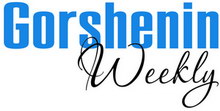
Crimea declares independence based on referendum results 
(2 Mb)

Issue # 9
03/17/2014
The Autonomous Republic of Crimea has held a referendum in which the
peninsula's population voted for joining the Russian Federation.
Read more in SITUATION IN CRIMEA READ MORE
- Gorshenin Weekly |
Published on EGF: 20.03.2014
| External Relations
-
Russia continues deploying troops, equipment to Crimea 
(2 Mb)

Issue # 08
03/10/2014
The Crimean parliament has decided on the autonomy's joining Russia as "a
subject of the Russian Federation". Situation in eastern Ukraine remains unstable.
You can find more details in the sections "SITUATION IN CRIMEA" and "DOMESTIC
POLITICAL". READ MORE
- Gorshenin Weekly |
Published on EGF: 17.03.2014
| External Relations
-
Russian Gas Supplies to Europe: the Likelihood, and Potential Impact, of an Interruption in Gas Transit via Ukraine 
(743 Kb)
 Jack Sharples, EGF Associate Researcher and Andrew Judge
Jack Sharples, EGF Associate Researcher and Andrew Judge
Do such organisations exist beyond the ‘self fulfilling prophecy’ level? Amidst the current tensions about Russian military deployment in Crimea, there has been considerable speculation in the European and American media about the security of Russian gas supplies to the EU. Such speculation is generated by a combination of concerns over the level of dependency on Russian gas imports faced by several EU member states and fears that the Russian government considers gas exports to be an ‘energy weapon’ that can be deployed against its former Soviet neighbours. This short article will address the likelihood of a suspension of Russian gas supplies to Ukraine and the impact of such a suspension on EU gas imports. READ MORE
- Gorshenin Weekly |
Published on EGF: 15.03.2014
| External Relations
-
Feb.15 2014. EGF Turkey File 
(405 Kb)
Insights into Turkish Domestic and International Politics during February 18-28th- 2014
By John VanPool, EGF Turkey and Black Sea Regional Analyst
Key Points:
- Ukraine loses control of the Crimean Peninsula, to the dismay of the region’s Muslim Tatar population.
- Turkey’s historical and cultural ties to the Crimean Tatars increase the chance that the conflict escalates. However, its connections may also offer a path for Turkish diplomatic efforts to intercede in further confrontation between Russia and the West.
- Leaked audio tapes appear to implicate Prime Minister Tayip Erdogan and his son of wrongdoing in the corruption scandal, though their authenticity remains disputed.
- Erdogan hits back following the recordings release, claiming that the international media, the Gulen Movement and other outside powers are behind the investigations.
- The peace process with the Kurds remains frozen as Abdullah Ocalan appears to warn the Gulen Movement against undermining the country by attempting a coup.
READ MORE
- EGF Editorial |
Published on EGF: 12.03.2014
| External Relations
-
EGF Gazprom Monitor 
(509 Kb)
A Snapshot of Key Developments in the External Relations of the Russian Gas Sector
By Jack Sharples, EGF Associate Researcher on the external dimensions of Russian gas and Lecturer in Energy Politics at the European University of St Petersburg
Key points:
- The calm before the storm: Gazprom fails to assuage EU concerns over pricing as EU continues preparing statement of objections in antitrust investigation
- Gazprom set to extend contract with Greece
- Gazprom agrees to withdraw from management of Amber Grid, and offers Lithuania lower gas price
- Russian loan to Ukraine strongly tied to Naftogaz’s debt to Gazprom
- Nord Stream AG completes feasibility study for expansion, with UK as target market
- South Stream consortium signs pipe supply contract for offshore section as Gazprom presses ahead with the project, despite uncertainties
- Gazprom and Shell sign roadmap for third LNG train at Sakhalin-II
- Gazprom HQ could relocate from Moscow to St. Petersburg by 2015
READ MORE
- EGF Editorial |
Published on EGF: 27.02.2014
| External Relations
-
Speaker Oleksandr Turchynov to act as president 
(2 Mb)

Edition #6
02/24/2014
On 23 February 2014, the Ukrainian parliament passed a resolution authorizing
speaker Oleksandr Turchynov to act as the president of Ukraine until a new
head of state is elected.
The presidential election has been set for 25 May 2014.
READ MORE
- Gorshenin Weekly |
Published on EGF: 24.02.2014
| External Relations
-
Ukrainian Parliament has become a centre for political decision making 
(1 Mb)

Special Edition
02/22/2014
A new situational majority has been established in the Ukrainian Parliament
(including representative of the Party of Regions faction, - ed.), that has supported
a number of laws and decrees of the opposition MPs.
It is also to note that as of 22 February 63 out of 210 deputies have left the Party
of Regions faction. READ MORE
- Gorshenin Weekly |
Published on EGF: 22.02.2014
| External Relations
-
Feb.1 2014. EGF Turkey File 
(405 Kb)
Insights into Turkish Domestic and International Politics during February 1-18th 2014
By John VanPool, EGF Turkey and Black Sea Regional Analyst
Key Points:
- The AKP-majority in parliament passes a restrictive Internet censorship bill despite opposition parties and international outcry.
- President Abdullah Gul declines to veto the measure, disappointing many who hoped he would be a moderating influence in the months to come.
- American President Barack Obama to skip Turkey in March trip to Europe and Saudi Arabia. The skip is indicative of the cooling relations between the president and Prime Minister Erdogan over a number of issues.
- TPAO declines investment in Iran for now, while talks on a pipeline deal in the Eastern Mediterranean and a détente between Turkey, Cyprus and Israel appears mutually beneficial.
- Iraqi Kurdistan connects pipeline to Turkish system, enraging a Baghdad already beset by a Sunni insurgency in Iraq’s western province. Turkey is collecting the KRG’s oil, but has refused to sell it on international markets until an accord is reached.
READ MORE
- EGF Editorial |
Published on EGF: 20.02.2014
| External Relations
-
